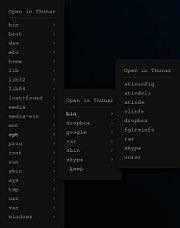Openbox:Pipemenus:Dirsmenu
From Openbox
Revision as of 16:20, 20 September 2014 by AaylaSecura (Talk | contribs)
Another pipe menu for recursive directory listing. I tried to keep the code as simple and short as possible. It uses Perl's File::Find to get the directories and files in the current directory and lists them in alphabetic order while making each directory a submenu. It escapes special characters and prints the underscore correctly (unlike obbrowser).
You can adjust options such as starting directory, show hidden files or show '..'
#!/usr/bin/perl
# Openbox menu to recursively list directories and files.
use File::Basename;
use File::Find;
use Cwd 'abs_path';
sub say { print @_, "\n"; }
sub print_files;
sub print_dirs;
sub fix_html (\$);
##################################################################################################
########################################## CONFIGURATION #########################################
##################################################################################################
# set default starting directory
our $base_dir = '/';
# true to show hidden files and directories
our $hidden = 1;
# true to show ..
our $show_up = 0;
##################################################################################################
# path to this script needed because it calls itself to list subdirectories
our $path = abs_path $0;
# when listing subdirectories, set the starting dir accordingly
$base_dir = shift if $ARGV[0];
# replace some special characters by their html codes
fix_html $base_dir;
# escape special characters in bash
$base_dir =~ s/(\ |'|`|!|\^|&|\*|\(|\)|\[|\]|\{|\}|&#..)/\\$1/g;
say "<openbox_pipe_menu>";
say "<item label=\"Open in browser\">";
say " <action name=\"Execute\"><execute>xdg-open $base_dir </execute></action>";
say "</item>";
say "<separator />";
find ( { preprocess => \&print_dirs, wanted => \&print_files }, $base_dir);
say "</openbox_pipe_menu>";
##################################################################################################
########################################### SUBROUTINES ##########################################
##################################################################################################
sub print_dirs {
my @dirs = sort grep { -d && ( !$hidden ? $_ !~ /^\./ : 1 ) && ( !$show_up ? $_ !~ /^\.\.$/ : 1 ) } @_;
my @files = sort grep { ( not -d ) && ( !$hidden ? $_ !~ /^\./ : 1 ) } @_;
for ( @dirs ) {
next if $_ eq '.';
$_ = $File::Find::dir . "/" . $_;
# replace some special characters by their html codes
fix_html $_;
# replace the underscore with a double underscore in the label to prevent openbox from interpreting it as a keyboard accelerator
( my $label = basename $_ ) =~ s/_/__/g;
# escape special characters in bash
$_ =~ s/(\ |'|`|!|\^|&|\*|\(|\)|\[|\]|\{|\}|&#..)/\\$1/g;
say "<menu id=\"$_\" label=\"$label\" execute=\"$path $_\" />";
}
return @files;
}
sub print_files {
return if $_ eq '.';
$_ = $File::Find::dir . "/" . $_;
# replace some special characters by their html codes
fix_html $_;
# replace the underscore with a double underscore in the label to prevent openbox from interpreting it as a keyboard accelerator
( my $label = basename $_ ) =~ s/_/__/g;
# escape special characters in bash
$_ =~ s/(\ |'|`|!|\^|&|\*|\(|\)|\[|\]|\{|\}|&#..)/\\$1/g;
say "<item label=\"$label\">";
say " <action name=\"Execute\"><execute>xdg-open $_ </execute></action>";
say "</item>";
}
sub fix_html (\$) {
my $ref = shift;
$$ref =~ s/&/&/g;
$$ref =~ s/"/"/g;
$$ref =~ s/\$/$/g;
$$ref =~ s/</</g;
$$ref =~ s/=/=/g;
$$ref =~ s/>/>/g;
$$ref =~ s/\\/\/g;
}
